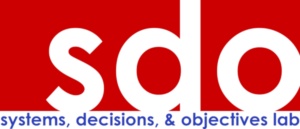Our research explores and advances how engineers design systems, arrive at actionable decisions, and frame problem objectives when faced with unresolvable uncertainties.
We recognize that engineering design is a decision-making process. Our research products help engineers navigate the challenges of designing complex engineered systems, especially when there are uncertainties that are known but unquantifiable. The tools/methods that we develop advance engineering design automation and design theory.
Why is this research important?
Design is a fundamental approach for solving complex problems. Engineering design requires the incorporation of interdisciplinary perspectives, creating solutions by synthesizing various components, dealing with uncertainty, and considering the unintended consequences of design decisions. When maximizing the value of an engineered product/system, engineers must constantly balance tradeoffs. These tradeoffs occur across the entire lifecycle, often arising from human, technological, organizational, and political factors that define the criteria under which the system operates. Our research is motivated by the fact that even the most basic engineering design decision requires a value analysis. Fundamental questions driving our work include:
- What information do product engineers need for making value-driven design decisions in a market-systems context?
- How do we maximize the user experience with the product/system?
- What is the right mix of products that should be offered?
- What is the relationship between system configuration/architecture and needs and preferences that change over time?
- How do we effectively manage change after a product/system has been fielded?
What tools do we use?
To address these challenges, we draw upon research advances in design automation, multiobjective / multidisciplinary optimization, customer preference modeling techniques (such as conjoint analysis and discrete choice theory), data analytics (including AI/ML), product customization, requirements definition, system architecture modeling, and change propagation techniques.
Currently, the lab pursues four primary research directions:
- Preference/demand modeling, product platforming, and product customization/personalization
- Designing complex engineered systems capable of reconfigurability, evolvability and resilience
- Inverse engineering design using machine learning and AI
- Advancing engineering design education
Who has sponsored our research?
Who we are
The Systems, Decisions, and Objectives Lab was founded by Dr. Scott Ferguson in 2008 when he arrived at NC State. Originally, our group was called the System Design Optimization Lab with a focus on integrating optimization approaches and design automation tools. In 2023, we found our interests shifting toward the engineering decision-making challenges created by unresolvable uncertainties.
Members of our group work to foster a collaborative, productive research environment. Where possible, Dr. Ferguson works with his students to identify research projects that fit within the lab vision and match their interest and passion.
Opportunities for new students
The SDO lab is always interested in finding motivated, ambitious PhD students who are interested in conducting research in the area of engineering design theory and design automation. Please contact Dr. Ferguson for further inquiries.


